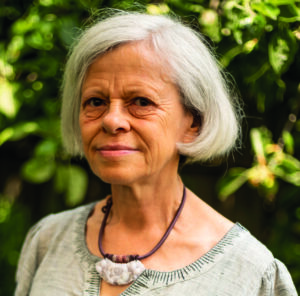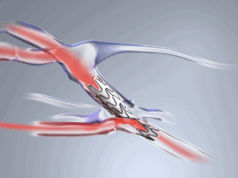At the recent UK Kidney Week (UKKW) meeting (11–13 June, Edinburgh, UK), a debate was held on the topic of dialysis modalities and which was the best option for elderly and frail patients. Presenting their arguments were the president of the International Society for Peritoneal Dialysis (ISPD), Edwina Brown (Imperial College London, London, UK), who was defending the statement “PD is the optimal dialysis modality for many when old and frail”, and Jeremy Levy (Imperial College London, London, UK), who was presenting his case against the statement.

First to present was Brown, whose main points were that PD allows for more freedom and a greater quality of life for the patient, and that patients who are elderly and frail experience a great decline in mental faculties whilst undergoing haemodialysis, when compared to PD.
“Let’s think about that from the person perspective. So, clearly being on haemodialysis gives you a bit of a social structure, but I think there are many better social things you can do than sit in the haemodialysis unit three times a week. You need transport, you feel washed out, and it’s going to interfere with your social and family life. You’re going to have to worry about [dialysis] access, and it can be difficult to travel. PD gives you independence, many fewer visits to the hospital. There’s the flexibility of doing it; most of our patients don’t do seven days a week, they do five or six days a week. So the treatment burden is much less, and you can give them assistance for doing the dialysis.”
A main concern for older patients, Brown argued, was the possibility of a decline in cognitive function. “My friends and I are getting older, and what really worries us is developing dementia. We’ve seen parents who’ve had dementia, and we’ve seen friends who get dementia.” She asked the audience how many of them discuss the more rapid drop in cognitive function for patients undergoing haemodialysis, emphasising that it should be an essential part of the conversation when reviewing the different dialysis modalities that are available to patients. She also referred to a study conducted in the USA that, when MRI [magnetic resonance imaging] scans were done on older patients during their haemodialysis treatment, which showed they were suffering from acute brain injury during each haemodialysis session. She again asked the audience a question; “How many people in this room would want their older parents or grandparents to have acute brain injury three times a week?”
Bringing her presentation to a close, Brown stated that the key message is “we should be focusing on the wellbeing of the older person”. She argued that for somebody who develops advanced kidney disease, putting them on haemodialysis as a routine can really disrupt their quality of life, whereas maintaining them on an assisted PD programme can maintain their quality of life and actually improve their symptoms.

For his counter-argument, Levy approached the debate from a different perspective; should dialysis, no matter the modality, be considered at all for elderly and frail patients? His opening statement was that his opponent had, in fact, made an error. “Edwina has made a fundamental mistake. She’s conflated getting old with frailty.” He also stated that the example she had chosen to support her case, a 94-year-old male patient, was not even frail, as he was regularly gardening for his neighbour. He argued that, for patients that he referred to as “truly frail and elderly”, it may be due to the fact that they are “reaching the end” of their natural lives. Levy encouraged the audience to “forget this choice between PD and haemodialysis,” and instead advocated for conservative and supportive care, in the truly frail elderly. He also reminded the audience about the crucial research study published in 2009 by Tamura et al in the New England Journal of Medicine, of 3702 truly frail people starting any dialysis modality, as they were all nursing home residents in the USA. After starting dialysis (haemodialysis or PD), 58% were dead within one year, 87% had died or had worsened functional status, and only one in eight had even maintained their functional status. He argued that in truly frail elderly people, this showed dialysis was really offering no benefits at all. He did concede that PD may be a better option for elderly patients than haemodialysis, saying that “if people do want to have a choice between haemodialysis and PD, I don’t disagree that they could be offered a choice,” but stipulated that it should be the patients’ choice, rather than a physician choosing on their behalf.
Levy also queried how elderly patients should be defined. “Much of the data out there takes people over the age of 60,” he stated. “I am now over 60. I’m certainly not frail, but I am getting older. Edwina is marginally older than I am. She is also not frail, but getting older.” The issue with defining which patients are considered elderly, he argued, is that “all the data in the literature is completely mixed about definitions of ages,” and this is without considering “the whole issue about frailty”. Taking this into consideration, he argued that there is little point emphasising one dialysis modality over another for frail, elderly patients, as there is not even a consensus on who those patients are.
Bringing his argument to a close, Levy postulated that conservative care may be much better than either dialysis modality. “I suggest you may not want either. We’re often talking about people who are older and frail, whose eGFRs [estimated glomerular filtration rate] are falling towards 10, and I would suggest you need to think very hard; is the patient just reaching the natural end of their life? If you’re sure about that, then support them, their family, improve their symptoms, and if you’re not sure, really, really, really, really think hard.” He did add that you should discuss all options with the patient, but that they key point was to “only do medical stuff if you really think this might be a benefit. Then, I don’t disagree, sometimes there might be a case for [PD].”
His final statement was that “it’s about patient’s choice, and PD may well not be the optimum dialysis therapy”. The patient who is living with renal failure, who’s clearly not frail or very elderly, may, in his opinion, choose either option, but it is fundamentally about the choice.
Whilst there was no formal voting during the debate, the general consensus in the auditorium appeared to show that, whilst Levy had managed to get a few extra votes against the motion, the overwhelming majority agreed with Brown and felt that PD was, in fact, the optimum dialysis modality for elderly and frail patients. However, several audience members reflected that this can only work well if people can have access to assisted PD schemes, since by definition, frail elderly people cannot undertake PD themselves, and this was limiting in many places in the world.











